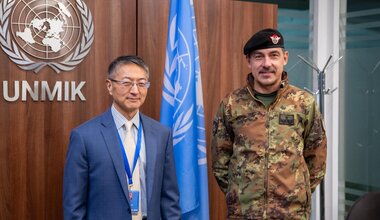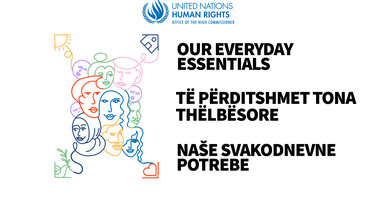14 Jun
2013
14 June 2013 - SRSG Presentation to the Security Council
Mr. President, Excellencies,
On the 19th of April, following difficult political negotiations personally facilitated by EU High Representative Catherine Ashton, a historic “First Agreement on principles governing the normalization of relations” was initialed between Belgrade and Pristina.
The agreement, consisting of 15 points, provides for the establishment of an “Association/Community of Serb Municipalities” that would enjoy a range of competences related to the day-to-day life of the people. It also envisages holding of local elections in 2013 in municipalities of northern Kosovo with the facilitation of the OSCE. The parties also undertook not to block the other side’s progress in their respective European Union integration paths. An implementation committee comprising representatives from both sides is to be established under the European Union facilitation. Importantly, the sides also affirmed the need to continue to engage in the political dialogue.
The Secretary-General welcomed the agreement and encouraged the parties to conclude this historic process and take concrete measures for a faithful implementation of the agreement.
I wish to extend my congratulations to the leadership of both sides, who are present today in this chamber, for having demonstrated the wisdom, prudence and political foresight in taking – jointly – this fundamental step forward.
Such determination and persistence will also be needed to sustain this spirit of compromise and mutual respect, as they carry their agreement forward.
As a sign of their commitment, the parties agreed on the 22nd of May on an Implementation Plan for the provisions contained in the 19 April Agreement.
The plan provides for timelines of implementation which will require both sides to move ahead expeditiously. It is evident that a high degree of commitment, flexibility and creativity will also be required to meet the ambitious timelines foreseen in the Implementation Plan.
I believe that support and resourcefulness will also be needed from the international community to help ensure that positive momentum is sustained in the face of inevitable challenges.
While the international community has regularly committed a strong level of political engagement and resources to promote progress, this is perhaps still more crucial during the coming period for all international presences in Kosovo. A generous investment in resources and efforts will preserve the dividend of peace in the region and the support for an integrated and coordinated implementation process will be critical.
Among others, a key factor for the successful implementation of the 19 April agreement will be its support by the northern Kosovo Serbs. I appreciate the courageous and continuous efforts of the Belgrade leadership to reach out and raise understanding and support for the Agreement among the leaders and population of northern Kosovo. These efforts have included pro-active exchange and visits by senior Government officials to address the concerns of Kosovo Serbs with regard to the impact of the agreement on their future.
Equally, I wish to stress that this support cannot, and should not, be seen solely as the responsibility of Belgrade. All share responsibility for better communications with the population of the North, and for taking actions that address – rather than exacerbate -- their concerns and legitimate interests. Public protests held in North Mitrovica, including a mass rally of several thousand Kosovo Serbs on 22 April and subsequent demonstration organized by university students on 25 April, indicates the level of continuing apprehensions, as well as the paramount importance of better communication to all groups and stakeholders in the North.
Over the past week, joint working groups have been focusing on the implementation details as well as other issues, such as energy and telecommunications, and exchange of liaison officers. These discussions are taking place against the backdrop of the upcoming consideration by the EU Council of Serbia’s and Kosovo’s progress on their respective EU accession tracks.
Mr. President,
We continue to witness the symptoms of tension and uncertainty in various parts of Kosovo, concerning the translation of political agreements into practice on the ground. As reflected in the Secretary-General’s report, the threat of instability remains present in sensitive areas – both north and south of the Ibar River. Too often, local leaders appear still reticent to speak out clearly and firmly, and to ensure effective response to acts of ethnic intolerance or intimidation directed at members of any community in Kosovo.
Regardless of these ongoing concerns, there were also some encouraging efforts on the ground alongside developments at the political level. In this respect, I would like to mention the active role that President Jahjaga has played in efforts to improve inter-ethnic relations in Kosovo.
The Kosovo Police have established ethnically mixed special units in four regions for the protection of Serbian religious and cultural heritage sites. The unit covering the Peć Patriarchate was constituted on 16 May, and is now working together with KFOR and church leaders to gradually assume greater security duties there. During the same timeframe, the implementation of the Law on the Historic Center of Prizren moved forward with the establishment of the Council tasked with monitoring progress and compliance.
Publicly-funded repairs and reconstruction of the Orthodox gravestones damaged or destroyed in a wave of attacks across Kosovo this past January is progressing. A majority of the affected gravestones have by now been repaired, and work is continuing. At the end of May, the Kosovo authorities, in cooperation with the Tony Blair Faith Foundation, organized a broad based inter-faith conference which included leaders of all faiths in Kosovo, including the Serbian Orthodox Church.
In compliance with UN Security Council Resolution 1325 on Women, Peace and Security, the Kosovo Assembly has recently revised legislation on benefits to include survivors of sexual violence during the conflict. This important addition followed active advocacy efforts by civil society organizations, together with the UN and other international actors on the ground.
I wish to take the opportunity today simply to highlight one additional crucial area in which progress could -- and in my view should -- accompany the progress being made through the current political processes. This relates to determination of the fate of persons missing since the time of the conflict. Although the Joint Working Group on Missing Persons continues to meet regularly, and reflects a spirit of increasing mutual respect and cooperation, much information vital to the resolution of missing person cases from both sides is still lacking. More serious efforts to locate and provide such information are needed from each side, which in turn requires a more substantial commitment at the political level. Without such commitments, progress on this crucial issue for reconciliation will continue to be unacceptably slow.
Mr. President,
The 19 April Agreement represents a major achievement and a decisive step forward for both Belgrade and Pristina which should contribute toward peaceful solutions of the issues which have long divided the parties. Energetic and cogent facilitation by the High Representative of the European Union has been fundamental to obtaining this result. No less so has been the political will and leadership demonstrated by the parties who aspire to join Europe and have assumed historic responsibility for difficult but necessary compromises.
The agreement sets a course which will be neither sure nor swift. In this respect, my sincere hope is that the membership of this Council – indeed the international community as a whole -- will continue to provide its resolute support to its progress. The situation on the ground, including the domestic political situation on both sides, remains fragile and it cannot be taken for granted that the progress being achieved now is irreversible or that it is simply assured.
The implementation of the agreements reached in the EU-facilitated process will require continued hard work by the parties and active support from the international community. UNMIK is making efforts to ensure that its activities, including its own supporting role on the ground contribute to the creation, in close coordination with international partners, of an enabling environment for the implementation of the agreement.
I wish to express deep appreciation to the members of the Council for their continuing political engagement with the parties, as well as my hope that such an engagement will remain steadfast throughout the coming delicate and challenging period.
I conclude by thanking you, Mr. President, and all members of the Council for your support to UNMIK, and for promoting the shared objectives of political progress, peace and reconciliation on the ground.
Thank you, Mr. President.
 UN
UN United Nations Peacekeeping
United Nations Peacekeeping





